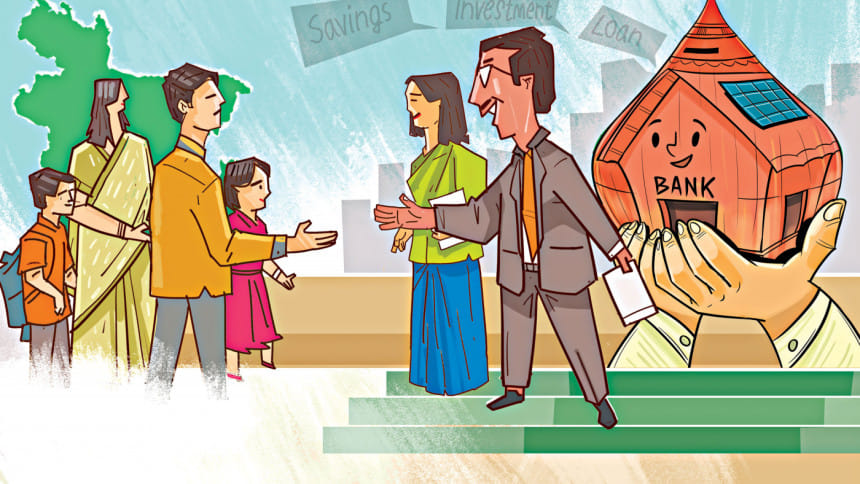Navigating Personal Finance

"Even though I earn a good salary, I often find myself broke by the end of the month," shares Mirza Naimul, a private job-holder who started a side business to tackle the crisis. Unfortunately, he failed to relieve himself from the financial crunch despite his double efforts due to a lack of proper financial planning. Despite its crucial role in ensuring a stable financial future and a stress-free present, personal finance management is largely overlooked in Bangladesh.
The personal finance landscape encompasses both short-term strategies, such as savings, debt repayment, budgeting for major purchases or investments, securing loans, and managing daily expenses, as well as long-term planning, including investing and retirement planning—each of which is essential for building and maintaining financial stability. Banks, Non-Banking Financial Institutions (NBFIs), and Mobile Financial Services (MFSs) are essential to personal finance, significantly aiding individuals' financial management through a variety of tailored, need-based products and services, and thereby driving economic growth.
Building a Secure Future
Personal finance is more than just a plan for money; it is a roadmap that guides financial decisions, helping achieve goals through strategic planning between resources and expenditures.
Savings, a core aspect of personal finance, heavily depends on individual habits. "Some earn well but fail to save proportionately, resulting in future financial struggles. Conversely, those with disciplined saving habits tend to prosper," said Md. Nehal Ahmed, director of the Dhaka School of Banking Management, BIBM.
Banks and NBFIs offer diversified schemes and services to meet the needs of different segments of society. "Everyone should save regularly, even if it means reducing necessary expenditures, to prepare for emergencies and unforeseen future needs. Depositors' money is essential to a bank, and individual deposits are highly valued," said Md. Quamrul Islam Chowdhury, Managing Director of Mercantile Bank. He also mentioned that banks aim to offer benefits that outpace inflation.
Popular savings schemes of banks include Fixed Deposit (FD), Monthly Savings Schemes (MSS), Double/Triple Benefit Deposit Schemes, Pension/Retirement Savings Schemes, Special Savings Schemes for Women, Islamic Savings Schemes, and Student Savings Accounts.
"One common and useful saving pattern is setting aside money for planned goals, such as education, medical treatment, travel, or Hajj, often using Deposit Pension Schemes (DPSs) or Fixed Deposit Receipts (FDRs)," says HM Mostafizur Rahaman, Head of Retail Business Division of Dhaka Bank.
To promote savings among youth, regardless of their location or profession, banks have introduced savings schemes with minimal deposit requirements. These products allow young people to accumulate funds through affordable monthly installments, providing nationwide convenience. To further appeal to younger customers, some banks have added features such as zero maintenance fees, free online banking, and Shari'ah-compliant financing options.

Besides offering competitive interest rates in specialized savings schemes, some additional benefits are tailored for women, including early encashment facilities on FDR, waiver on issuance fees, catering to shopping needs and traveling, special facilities on annual locker rent, and Deposit Pension Scheme. There are schemes linked with insurance facilities mostly for minors and women. The benefits include accidental insurance coverage, critical illness treatment, and more.
The Global Findex Database 2021 revealed that only 23 percent of people saved any money in the past year, and a mere 8 percent managed to access emergency funds within 30 days. In developing economies, individuals often rely on family, friends, and social networks for financial support during such times.
"Effectively managing uncertain events and emergencies reflects resilience against financial shocks. Those who practice sound financial management will be better prepared to handle future obligations and crises. Strong financial practices contribute to greater stability and security," said Dr. Muhammad Shahadat Hossain Siddiquee, a professor of Economics at the University of Dhaka.
To help individuals build wealth over time, financial institutions offer various investment options, including stocks, bonds, mutual funds, real estate, and other assets. Mostafizur Rahaman of Dhaka Bank explained that while some needs may not be emergencies, they still require prompt attention.
In these cases, investing in assets or addressing immediate needs—such as personal expenses, purchasing a car or home, business investment, or debt consolidation through installment loans—can be effective strategies.
Banks and NBFIs also offer loans that are often linked to specific savings products such as Fixed Deposit Receipts (FDRs), Deposit Pension Schemes (DPSs), or other savings accounts.
Debt consolidation, a useful strategy for individuals aiming to manage their debts more effectively, requires careful planning and an understanding of individual financial circumstances. Financial institutions often recommend a tailored repayment plan based on customers' current debt conditions. "To assist customers in managing and consolidating their debt, we have Relationship Managers (RMs) stationed at both our head office and branch locations, dedicated to providing personalized service and financial counseling," said Syed Mahbubur Rahman, Managing Director & CEO of Mutual Trust Bank Limited.
Dr. Md. Main Uddin, Professor & Director, Department of Banking and Insurance, however, said, "often these services are inaccessible to lower-income people and marginalized individuals due to the unfavorable arrangement of conventional banks and NBFIs."
Mobile Financial Services (MFS) have added new features to the landscape of personal finances, creating opportunities for women, the lower-middle class, and marginalized communities to save with less hassle than conventional banking. Through using bKash, anyone can build their savings weekly and monthly with minimal effort. There are monthly and weekly savings schemes, also known as DPS, offered by four commercial banks and a financial institution—BRAC Bank, Dhaka Bank, Mutual Trust Bank, City Bank, and IDLC Finance—on bKash's platform.
"Since its inception, financial inclusion has remained a core vision of bKash as it connected millions of unbanked and underbanked people with the formal economy. To facilitate a large user base of 75 million customers, bKash introduced a range of necessary financial products that are innovative, easy to use, and secure," said Shamsuddin Haider Dalim, Head of Corporate Communications and PR at bKash.
Appreciating this approach, Dr. Main Uddin highlighted the need to mitigate challenges associated with digital literacy and digital divide.
Pathways for Advancement
A key challenge in managing personal finances is determining the optimal allocation of financial resources. The choice of whether to invest in a current account, savings account, savings certificate, treasury bond, mutual fund, or fixed deposit depends on an individual's financial knowledge and personal circumstances.
"Globally, bankers frequently take on the role of financial planners. Since many customers lack expertise in financial planning, it becomes the bankers' responsibility to develop plans that address their needs. However, this approach is not yet fully implemented in Bangladesh. If bankers can embrace the role of financial planners, it could significantly improve money management for individuals across all sectors of society," said Khondoker Imran Hossain, Junior Assistant Vice President, Retail Distribution Division, Midland Bank.
Echoing Imran Hossain, Khurshed Alam, Head of Retail Financial Services, LankaBangla Finance, said, "Although our market is not developed enough to nurture personal finances comprehensively, Bangladesh Bank (BB) has been working on various initiatives to popularize it. If plans can be implemented successfully, we can hope to see the reflection within five years."
On this note, Al-Mamun Ansar, Head of Liability Business, Liability & Wealth Management of EBL, highlighted the children's financial schemes by the BB. "If a person can be taught about the importance of personal finances in childhood through having an account and control over it to manage the money, they will gain firsthand experience in personal resource management. This learning will definitely reflect in their future life," added Al-Mamun.
"Our financial sector is predominantly focused on lending, but enhancing savings by including all segments of society is crucial for capital formation and overall economic growth. Therefore, it is essential to popularize saving schemes through continuous campaigns, as they are a core component of personal finance," highlighted Prof. Main Uddin of Dhaka University.
Experts believe that a comprehensive approach involving all stakeholders is essential for advancing the overall development of the personal finance landscape in Bangladesh.

 For all latest news, follow The Daily Star's Google News channel.
For all latest news, follow The Daily Star's Google News channel. 



Comments